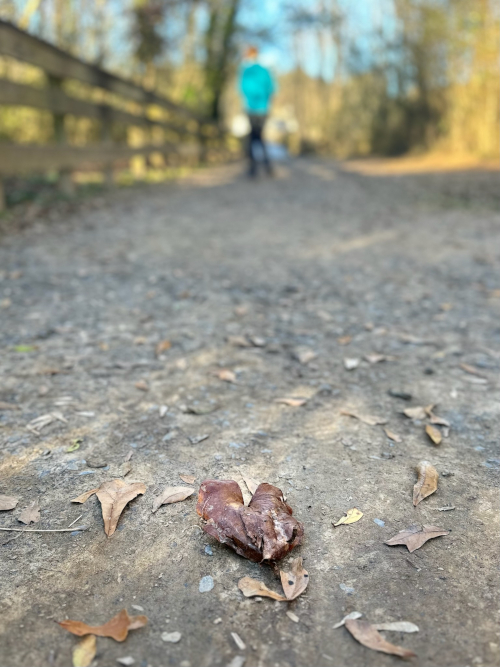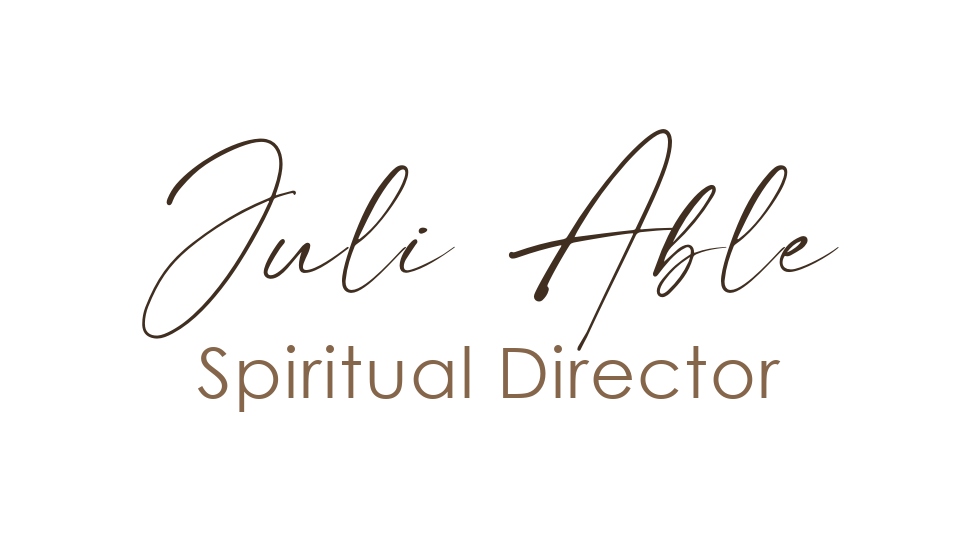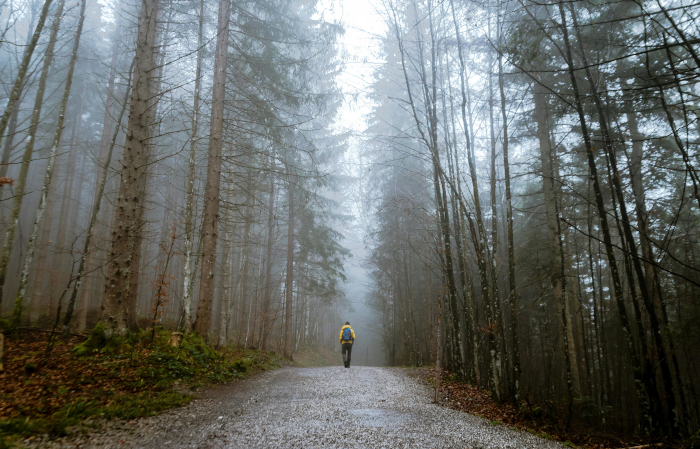A sun-speckled, winding road led to a sun-speckled, winding footpath. Our steps, softened by a pine needle carpet, brought us to our destination. It was simply and thoughtfully prepared. There’s not much you can add to a grove of live oaks at the edge of a swampy salt marsh, without overdoing it. The sun dipped low on the horizon. A breeze overhead ruffled the Spanish moss draped on long-armed trees. This was the most beautiful space for a wedding I’ve ever seen.
The bride and groom seemed at home in themselves and with each other. Their ease and warm hospitality was also beautiful. But there was something else I witnessed that weekend, even more beautiful to me.
The night before the wedding, the groom alluded, briefly and privately to me, of a struggle in his family. We shared the bond of a family grown and stretched by adoption. I sensed a rawness and weariness. Without him saying much at all, I felt an overwhelm and isolation lying just beneath a beautiful surface. They were all there, dressed in their finest, smiling in the pictures, celebrating their son and his new wife as best they could. And I wondered, if in some ways, they were barely, silently holding it together. Maybe that’s because of my history – where the surface is fragile, and I’m telling myself ‘It’s ok. I’m ok.’ But put a feather of stress on me and see what happens.
What stays with me from the weekend celebrations was the groom’s dance with his mom. He was a big boy, a grown boy, now a married man. Most of the dance his back was to me. It took her full stretched arms just to reach around his broad back. All I could see were her hands on his back. Her fingers spread. Every so often and ever so gently, patting, rubbing his back. Holding her son. Even now, as an adult. I saw in those hands a parent’s deep love and strong desire. The smallest gestures with the biggest feel. I felt it in my bones. It’s timeless. No matter their age, you want to hold them. You want to feel connected.
And sometimes they don’t let you. There are awkward years as kids pull away, moving toward independence. It’s normal. and Not. Easy. I don’t minimize that.
But these hands, that I couldn’t look away from, perhaps knew another kind of pain, another layer of grief, another category of loss and helplessness. I’m not comparing. I’m just saying- it’s unique. And I say this even though I don’t know her. I don’t know her details. Her details vary from my details. But I know something of the desire to connect and the pain that can come when that is refused. It’s a pain that can isolate, because it clouds one’s sense of self and purpose. It can chip away at well-being, healthy confidence, and other relationships.
This mothers’ hands mirrored back to me my desire for closeness, and my pain of rejection, of being misunderstood, and of not being able to bridge the immense gap of disconnection. I didn’t know that my desire to be a mom would come with all this pain. It made my desire feel dangerous, maybe misguided, or even wrong.
It’s only been recently that I’ve learned the important role of listening to my desires in the context of spiritual discernment. By discernment, I mean “wisdom that enables me to see and interpret the leading of the Holy Spirit.” [i] It differs from decision-making (which is largely a thinking-based consideration of choices). Discernment, in contrast, comes from our hearts. It’s about discovering the deepest desires of our hearts, those planted by God.
A retreat leader recently shared with me that only three questions are needed in places of discernment:
What do I want?
What do I really want? and …
What do I really, really want? [ii]
This surprised me. I’d been taught not to trust my heart. But in the cautionary advice, I failed to even listen to my heart. I just stuffed all that mess in the caboose. Problem is, the caboose got heavier and heavier. Feelings don’t go away when I ignore them. They still influence me; I’m just less aware that they are. A heavy caboose is train wreck waiting to happen! Or it’s an inevitable break down. And while it’s unwise to immediately trust my feelings, it’s crucial to examine them, which is what these three questions invited.
I learned that the first question (What do I want?) will likely elicit fears and anxieties taking up space inside. (I want my son to not lose his job. I want him to stop self-harming. I want this new therapy to provide relief.)
The second question often touches the surface of life. Not necessarily superficial, but of a more practical nature. (I really want a vacation. I really want a quiet, peaceful day – a break from the tension. I really want to go hiking in the woods on a cool, fall day.)
This opens the way to the third question, peeling back another layer, reaching deeper desires, God-planted longings in my heart. (I really, really want to feel supported. I really, really want to know I’m not alone in this. I really, really want to show up as I am, as I am able, and be accepted. I really, really want to experience God’s presence where I am and feel completeness and contentment here. I really, really want my son to be whole.)
George Ashenbrenner, a priest and author says, “To discover what we deeply, truly desire forces us to wade into a swamp of needs, expectations, demands, casual wishes, moods, obligations, and much more. Your deepest, truest desire may coincide with one or another of these interior experiences but will always cut deeper into your heart than any of them.
True desire is fire in the heart.” [iii]
True desire is fire in my swampy heart.
That’s why the mother of the groom, dancing with her son, moved me so. Because what I sensed in her hands, the desire to hold, care, connect – touched the fire in my heart from which our adoption journey began. And I needed that jolt. Because years of wear and tear and turmoil on every person and relationship in our home caused me to doubt and to wonder – What was I thinking when we chose to adopt? Because the love we had to offer wasn’t enough and the therapies we invested in didn’t help, because extended family relationships started breaking down, I questioned –Did I hear God wrong on this? Because I’d observe our son in our home and see how miserable he was, an accusing voice in my head taunted – Was it my American arrogance that thought he’d be better off with us?
But growing in discernment, I became aware – God isn’t asking these questions. In fact, as I stayed with this mother-son dancing-holding moment, I sensed God impressing upon me – You didn’t get this wrong. I want you, to please stop, analyzing and second-guessing. Stop tearing yourself down. You were following the desires of your heart and My heart. That place of discernment and invitation and your yes to Me is holy, sacred, and good.
Moreso, I sensed I wasn’t the only one to ever feel this way, to ever doubt myself. There are times we all need such a mirror, to look back and feel the fire in our hearts where a journey began. I can’t offer a magnifying glass that makes sense of it all. But a mirror, reflecting a holy fire in the deepest place of a heart.
Trevor Hudson, a South African Methodist pastor, often urges, “listen to the longings in your heart because your longings are your bus ticket home. Let longings lead you. Let them inform your next step.” [iv] With a fresh glimpse into the fire in my heart, I reflect on a season of discernment around adoption and know – I was listening to my deep longings. I can rest in this. And let it rest.
But discernment is not a one and done. Not a transaction. Not a checklist. Listening to our longings takes us on a journey. And this journey will always be some measure of incomplete and contain mystery that refuses to define the end of what should happen. It can be me, and others, the culture, and even the church that sometimes writes in quicker happily ever after stories. These are smaller stories. They are less, not more.
When I don’t trust God, I tell smaller stories – when I’m living in fear and want to hurry the story, or eaten by guilt and want to fix the story, or swallowed by doubts and want to run away from the story, or controlled by pride and think I know how this should go. All – smaller stories.
But walking by faith asks me to be open and free and continue to discern – because I don’t know where I’m going or what this is going to look like. God writes long stories, life-long stories. So discernment is always on-going, because the journey is continuing to unfold. This looks like staying in touch with my desires in the present moment.
Today – What do I want? What do I really want? What do I really, really want? becomes a path that leads me to God’s Spirit dwelling in my deepest longings.
And by this, God leads me home … home to purpose, home to contentment, home to freedom, home to God.
Your deep longings matter. They greatly matter. This isn’t sentimental, or even just compassionate. It’s actually very practical also: Your deepest longings matter because this is where you find God and this from where God leads.
Experience has taught me that it’s not just the destination that beautiful. Beauty and goodness are waiting to be found all along the winding path. They like to surprise me; They often inform me. I’m learning to become a noticer. Invariably, if I’m seeking God, the path will bring me to the edge of my swampy heart. It’s God’s favorite destination, but not always mine. And it’s always better exploring it with some company.
“My Lord God, I have no idea where I am going.
I do not see the road ahead of me.
I cannot know for certain where it will end.
Nor do I really know myself,
and the fact that I think that I am following your will
does not mean that I am actually doing so.
But I believe that the desire to please you does in fact please you.
And I hope I have that desire in all that I am doing.
I hope that I will never do anything apart from that desire.
And I know that if I do this
you will lead me by the right road though I may know nothing about it.
Therefore will I trust you always
though I may seem to be lost and in the shadow of death.
I will not fear, for you are ever with me,
and you will never leave me to face my perils alone.”
― Thomas Merton [v]

This is a nearby path I walk with a friend. We both get lost sometimes, disconnected from our deepest desires. Here, it’s safe to share a swampy heart.
As we walk, we often find our way again. We recognize the path with God as one of love.
It’s not achievement, not success, not perfection, not humankind’s approval that assures us we’re in the right place. It’s love – for myself, for God, and ultimately for others.
Questions For Reflection…
- Ask yourself, in the company of God – what do you desire? That first question. That first layer within. The one that likely connects with your fears and anxieties. Don’t second guess this. Don’t try to clean it up. Simply and honestly offer to God whatever comes up. God wants to hear all of it.
- And now, the next question – What do you really want? Look again, within your swampy heart, and name these desires – the more practical things lying on the surface of your life. Place them before God in your mind’s eye.
- Return once more to the question. Another layer deep. As you are able, begin to put your own words to your deepest longing. What do you really, really want?
If this really is your bus ticket home, what do you want to do?
(Your deepest internal longings will feel more like water hitting a sponge than water hitting a rock. … something you are drawn toward, not driven by, not forced or coerced. You’ll likely find a measure of peace, accompaniment, or resilience emerging. This may not align with common sense or a big external sign or what others say or think. This will come from within you where God dwells.)
- Our most authentic, deep desires always lead us out of ourselves – toward others, yes, and also laying down our many varieties of self … self-protection, self-image, self-reliance, self-promotion (while not neglecting self-care). As you offer your deepest desires to God, are there other desires you need to release?
- Is there a situation/past decision where you are questioning yourself? What is causing you feel doubt? or fear? or guilt? or pride? Where might you be hurrying, fixing, running away, or assuming you already know the answers? What role has desire played in this situation? As you open this to God, is there something God wants to tell you or show you? Is there something God wants to give you – some gift of grace?
- Where have you recently experienced beauty or goodness? How have they surprised you? How might they be informing you? Maybe experiment with becoming a Noticer of beauty and goodness in your day. Slowing down can help 😉
- Who keeps you company in the swampy places? How do you make time for this?
- Is there a word or phrase from Thomas Merton’s prayer that stays with you? that resonates? or disturbs you? Pause to share that with God, along with any questions or feelings that come with it. Allow space for God to respond to you. Let a conversation begin.
Juli Able
[i] Father Jim Manny, S.J.
[ii] Father Jim Fleming, “Discerning Great Desires in Ignatian Prayer, Ignatius House Retreat Center, Atlanta, GA, May 2, 2023
[iii] George Aschenbrenner, S.J., “Stretched for Greater Glory”, 2004=
[iv] Trevor Hudson, “God and You: A Preached Retreat with Ignatian Flavor”, The Wings Center at Eagle Ranch, Sept 25-28, 2022
[v] Thomas Merton, “Thoughts in Solitude”, 1958.


Thanks for sending this Juli! It was a perfect day for it. It’s been a good past several months, and today was good too, but I hit a point this week where my brain just wouldn’t stop considering various actions and agendas. I worked out tonight. Sat in silence. Tried a few other tricks. The article was perfect timing to calm my mind. Actually turning my phone off in 5 minutes until Saturday bc of this. Glad you’re doing this!
SO much goodness and truth here Juli! Thank you.
Hello, Juli. I love everything about this tender, wise post. The layout of your website. Your gentle honesty. The integrity with which you share important truth.
Congrats on this new adventure with God. I know that life-giving gifts will blossom within and around you as you do this hard inner work.
This is beautiful! Thank you for sharing!